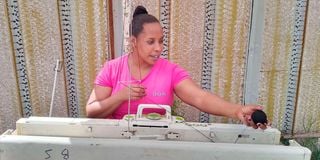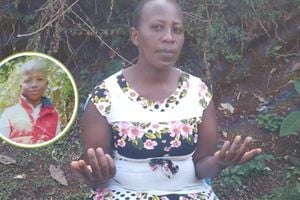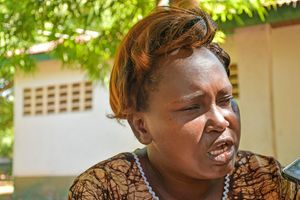
Ms Carole Muthoni Ngugi works with her embroidery machine outside her house on January 8, 2025.
It was New Year 2010 when Mrs Carole Muthoni’s life plunged into darkness - literally. She went to bed with her eyesight intact but woke up blind on 2 January.
She was 25 years old, married for eight years, and had two children.
“It marked the worst nightmare of my life then. I was married and a mother to an eight-year-old daughter and a son. What immediately came to mind was that my in-laws had finally bewitched me,” she says.
Although she has since regained her confidence after becoming a gospel artiste and training in Braille, embroidery, and massage, her story is one of a fate determined to test her and her continued refusal to yield.
It was not easy for her to move from denial and self-hate to eventual self-acceptance and personal growth.
Her poor family was confused about how to deal with her sudden blindness, with some suggesting that goat or lactating mother’s milk be put into her eyes. Despite this being done, her sight was not restored.
After five days of hoping against hope that her eyesight would return as suddenly as it had gone, the family decided to take her to hospital.
Poverty
Ms Muthoni says her major obstacle was the poverty that had surrounded her throughout her life, forcing her to drop out of school in Standard Six and start working in quarries in Gathangari village, Kandara constituency. “I would get paid Sh60 per day for work done from 7 am to 5pm. Poverty is the worst form of degradation,” she says.
It was while working in the quarries that she met a suitor at the age of 16, dated for a year, and got married at 17.
“When I became blind, and before I could be taken to hospital for a check-up, my husband developed a daily routine of beating me up,” she says.
Things only got worse after the sudden blindness.

Ms Carole Muthoni Ngugi works with her embroidery machine outside her house on January 8, 2025.
“The furthest I could go without help was groping my way outside the door. I contemplated suicide,” she says.
Nevertheless, in the third week of her blindness, she was taken to a hospital in Thika town, where she was admitted.
According to medical documents by Dr Tom Omondi, several tests were conducted on her.
When her vision was inspected, it was discovered that she had suffered years of blood clotting in her nerves.
“Noted were old blood clots on both eyes’ nerves that, over time, caused blindness. Diagnosis: Central retinal artery occlusion—a blockage in the central retinal artery, often caused by a blood clot or cholesterol,” Dr Omondi indicated.
It was during patient interrogation that an accident she had at 12 years old came to prominence.
While playing in the village, she collided head-on with a male playmate, leaving her with a cracked tissue just above the right eye.
Her parents arrested the gushing blood by applying salt to the wound, and tying it with a piece of cloth. After two weeks of washing and redressing the wound, she was considered healed.
Dr Leonard Gikera from Murang’a Level Five Hospital says all head, face, and chest injuries should never be taken for granted.

Carole Muthoni Ngugi walks in her compound on January 8, 2025.
“In Ms Muthoni’s case, that accident was significant. Any accident that leaves your head or face with wounds should be treated as serious until proven otherwise. Such incidents can lead to stroke, paralysis, blindness, or even sudden death,” Dr Gikera said.
“Listening to the doctor, the little hope I had in that hospital bed evaporated, leaving me with a hollowness that made me embrace the grave as the only reprieve,” she said.
She says the doctor might have noted her desperation, as he waived her bills and admitted her to a week-long counselling session.
“But even when I left the hospital, I refused to go to my marital home, opting to go to my mother’s house. My agenda then was to commit suicide silently in her house,” she says.
However, a new inspiration struck her in 2012.
“I do not know where the inspiration came from - I just found myself composing gospel songs. It was as though everyone was waiting to see me gain an ounce of positivity to support me,” she says.
Family members fundraised to take her to a studio, where she released her first album.
Mary Wanjiru, a seasoned gospel artiste known as Shiro wa GP, inspired and helped her produce three albums containing 19 songs in 2012. This included Wendo wa Nguvu (Mighty Love). Other albums followed: Utetagia Ngai Niki (Why Quarrel with God?) in 2014 and Wigirie Maithori (Wipe Away Your Tears) in 2016.
Through Shiro wa GP and inspirational speaker Anne Kariuki, popularly known as Gikombe kia Ruo (Mug of Pain), Ms Muthoni started receiving church invitations to share her story. Congregations would fundraise for her.
“In 2015, after saving Sh53,000, I moved out of my mother’s care and rented a house in Thika town, where I faced stigma from male tenants and my landlord for refusing their advances,” she says.
In 2018, she was sponsored to join Machakos School for the Blind, where she began a new phase in her life.
“I went straight into Braille, which I mastered in three months. My tutors were amazed at how fast I had accepted my situation. I also trained in embroidery and massage,” she says.
Today, Ms Muthoni earns her living through embroidery, motivational speaking, brand ambassadorship, and massage therapy.
Her dream is to establish a secure massage parlour with staff to serve both male and female clients.
“I also plan to further my education and complete my home in Juja’s Runda estate, which is halfway done,” she says.
Her journey from darkness to light is one of resilience, faith, and triumph.






